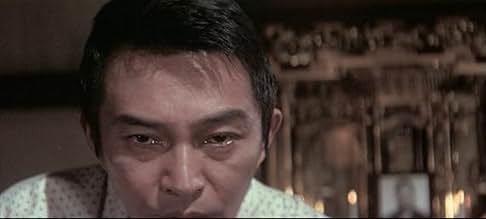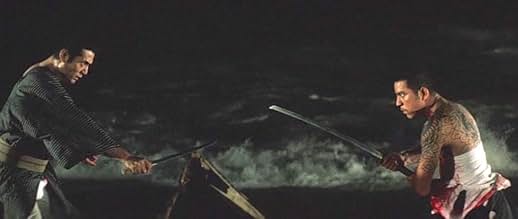Ajouter une intrigue dans votre langueAfter going to prison for killing the boss of the Kanno gang, a gangster gets released early - only to find that his ex-gang has merged with the Kannos. But with bitter resentments lingering... Tout lireAfter going to prison for killing the boss of the Kanno gang, a gangster gets released early - only to find that his ex-gang has merged with the Kannos. But with bitter resentments lingering on both sides, bloodshed is bound to begin anew.After going to prison for killing the boss of the Kanno gang, a gangster gets released early - only to find that his ex-gang has merged with the Kannos. But with bitter resentments lingering on both sides, bloodshed is bound to begin anew.
- Réalisation
- Scénario
- Casting principal
Avis à la une
Unlike many other films by Hideo Gosha this one sort of operates as a reverse action film. The first ten minutes are the most exciting and visually active and the climax, despite the brutality on screen, is almost leisurely. Was that the intent? It's hard for me to say.
The film follows the lives of several gangsters after they have been suddenly pardoned by the new Japanese government in the late 1920's. Jailed after a fatal inter-gang fight the ex-cons attempt to return to their old gangs but find everything has changed. Things don't go easy and the inevitable final conflict is set in motion.
Dense with plot and gangster etiquette, this is not an easy film to jump into. Gosha's earlier samurai films are more accessible. The plot revolves around Tatsuya Nakadai's withdrawn and moody gangster but it takes detours with some of the other characters which can be confusing. The photography is dark and saturated with color. It's hard to see clearly what's happening at times but that seems to have been intentional. The fights are very realistic with nearly everyone killing each other with short knives. Not the clear stylized slashes of a samurai sword where the victim just falls over dead, these are brutal horrible deaths. The excellent music is very influenced by Morricone's western themes unfortunately including the incessant repetition of the same theme over and over (something that Morricone really didn't have control over). The pacing is slow, sometimes pretentious. At two hours it can be an effort.
I saw this in the late seventies at it's New York premier and just again recently. I feel the same way about it still. You may like it but be prepared for the slow pace after the quick start.
The film follows the lives of several gangsters after they have been suddenly pardoned by the new Japanese government in the late 1920's. Jailed after a fatal inter-gang fight the ex-cons attempt to return to their old gangs but find everything has changed. Things don't go easy and the inevitable final conflict is set in motion.
Dense with plot and gangster etiquette, this is not an easy film to jump into. Gosha's earlier samurai films are more accessible. The plot revolves around Tatsuya Nakadai's withdrawn and moody gangster but it takes detours with some of the other characters which can be confusing. The photography is dark and saturated with color. It's hard to see clearly what's happening at times but that seems to have been intentional. The fights are very realistic with nearly everyone killing each other with short knives. Not the clear stylized slashes of a samurai sword where the victim just falls over dead, these are brutal horrible deaths. The excellent music is very influenced by Morricone's western themes unfortunately including the incessant repetition of the same theme over and over (something that Morricone really didn't have control over). The pacing is slow, sometimes pretentious. At two hours it can be an effort.
I saw this in the late seventies at it's New York premier and just again recently. I feel the same way about it still. You may like it but be prepared for the slow pace after the quick start.
I was very impressed with Hideo Gosha's early Showa era yakuza film The Wolves (1971). I think this has more to do with the mise en scene than the story. Because in many ways it is a typical ninkyo eiga, or chivalry film, about restoring honor among criminals. However, what elevates the film is the locations, set designs, costumes, historical background that informs the story, as well as having Tatusya Nakadai in the lead role as Seiji Iwahashi. Iwahashi was released on a general pardon at the occasion of the Showa Emperor Hirohito's ascension to the throne in 1926. Gosha uses classical framing in many of the discussion scenes that drive the plot as well as having the main action take place during a festival in which Nebuta-like floats are being paraded on the grounds. Several of the interiors display traditional art on the walls and screens. There are several scenes shot near the sea that use the fierce forces of nature as a prop to the scenes.
Widely regarded as one of Japan's most eminent filmmakers, Hideo Gosha's exceptionally refined artistry is put to inspired use in his immaculately shot, doom-laden masterpiece 'The Wolves'. Dark, brutal, melancholic, and peppered with astringent outbursts of uncomfortably intimate violence, 'The Wolves' retains all of its visceral intensity. Hideo's layered, emotionally dense, potently simmering study of loneliness, fealty, and love is never less than impressive. While ostensibly a stark tale of Yakuza blood feuds, there's a depth to these lucid characters actions which lends gravitas to their scheming. This rich, consistently fascinating, highly detailed narrative is brought to vivid life by a compellingly focused lead performance from Japanese icon, Tatsuya Nakadai as weary, flint-edged gangster, Seji Iwahashi. 'The Wolves' (1971) is muscular, vital filmmaking with an unsually deft touch, music maestro, Masaru Satô's sprightly score is exemplary, and the bravura brine-lashed climax is sure to take your breath away!
The Shussho Iwai took place in late twenties when the elder Imperator was replace for his young son, in that time Japan was a most a powerful nation of Eastern, also prearranged its expansion at Manchuria in China, then the government braced himself to sending to there woods and rails to construct a large railroad at Manchuria soon as possible.
The main glimpse was the two opposite Yakusa nemesis were share the operation without any disagreement to avoid of both sides lost money in the such profitable endeavor, sadly someone explodes the Railroad and dozens of Yakusa's members were sent to prison, in four years the new Imperator gave the pardon for those inmates, release them in order to fulfill the remainder of the sentence in parole.
Since then both Yakusa's gangs make a hard agreement to work together each one upheld its own territory and no more hard feelings concerning the past, for now on the Yakusa code will be respect to the extreme, nonetheless wounds not yet healed, even part four years old, the Yakusa's summit already aware about it and decide dismiss some troublemakers like as Gunjiro Oseki ( Noburo Ando) that was deadly enemy of Seji Iwahashi (Tatsuya Nakadai) that is the next to gave the blue card, among treachery, greedy, hidden interests the association of both Yakusa's clans is crumbles.
Hideo Gosha imposes a narrative of the storyline through in 3th person, it somewhat gave to the movie a documentary look, also has many sub-plots that enhances the picture itself, a bit slow pace in many sequences, letting the picture dispersive, although the chase through the city at festival and last showdown at seashore overcame all possible weakness!!
Thanks for reading.
Resume:
First watch: 2023 / How many: 1 / Source: DVD / Rating: 8.
The main glimpse was the two opposite Yakusa nemesis were share the operation without any disagreement to avoid of both sides lost money in the such profitable endeavor, sadly someone explodes the Railroad and dozens of Yakusa's members were sent to prison, in four years the new Imperator gave the pardon for those inmates, release them in order to fulfill the remainder of the sentence in parole.
Since then both Yakusa's gangs make a hard agreement to work together each one upheld its own territory and no more hard feelings concerning the past, for now on the Yakusa code will be respect to the extreme, nonetheless wounds not yet healed, even part four years old, the Yakusa's summit already aware about it and decide dismiss some troublemakers like as Gunjiro Oseki ( Noburo Ando) that was deadly enemy of Seji Iwahashi (Tatsuya Nakadai) that is the next to gave the blue card, among treachery, greedy, hidden interests the association of both Yakusa's clans is crumbles.
Hideo Gosha imposes a narrative of the storyline through in 3th person, it somewhat gave to the movie a documentary look, also has many sub-plots that enhances the picture itself, a bit slow pace in many sequences, letting the picture dispersive, although the chase through the city at festival and last showdown at seashore overcame all possible weakness!!
Thanks for reading.
Resume:
First watch: 2023 / How many: 1 / Source: DVD / Rating: 8.
This film is so marvellous to look at that you may wonder if Rembrandt has been re-born as a Japanese movie-director. Hideo Gosha has made an undisputable master-piece about rivalry, betrayal and the feud over a train-line. It is a classic gangster-film with a labyrinth-like plot. The Wolves is the real thing. This film is one of the best films ever made.
Meilleurs choix
Connectez-vous pour évaluer et suivre la liste de favoris afin de recevoir des recommandations personnalisées
Détails
Contribuer à cette page
Suggérer une modification ou ajouter du contenu manquant

Lacune principale
By what name was Les Loups (1971) officially released in Canada in English?
Répondre




















